When ants start marching one by one into your kitchen, you want to fix the problem—fast.
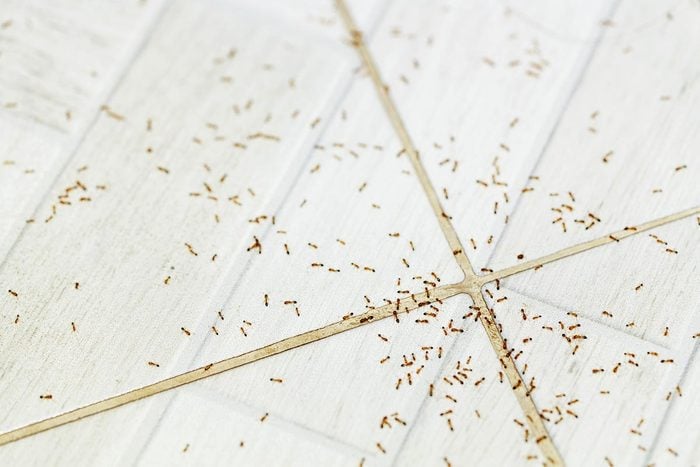
9 Ways to Get Rid of Ants in Your Kitchen


Warm, Soapy Water
The first step to banishing ants is to clean your house thoroughly. No need for fancy chemicals here; use warm, soapy water, which easily banishes dirt and crumbs and also effectively tackles grease and sticky residue that may draw ants.
Make a habit of a quick tidy every day. Sweep food crumbs, clean countertops, wipe up spills, take out the garbage and don’t leave dirty dishes anywhere but the sink. Scrub the top of the stove and inside the microwave—both are common sources of crumbs. Store all your food in airtight containers or tightly sealed bags.

Vinegar
Where you see one ant, you’re bound to see others. That’s because ants leave a scented trail that other ants follow. Sweeping or mopping won’t eliminate the scent. The secret is household cleaning superstar white vinegar.
Mix one part vinegar with three parts water in a spray bottle, then spray wherever you’ve seen ants in the past. This will stop outdoor nesting ants from following ant trails inside.
While you’ve got the vinegar out, use it to rinse pet food bowls between feedings. If you leave food out for your pet during the day, spray vinegar mixed with water around the food bowls to keep ants from visiting.
Editor’s Tip: Vinegar and water will only repel ants. To kill them, you’ll need ant bait.
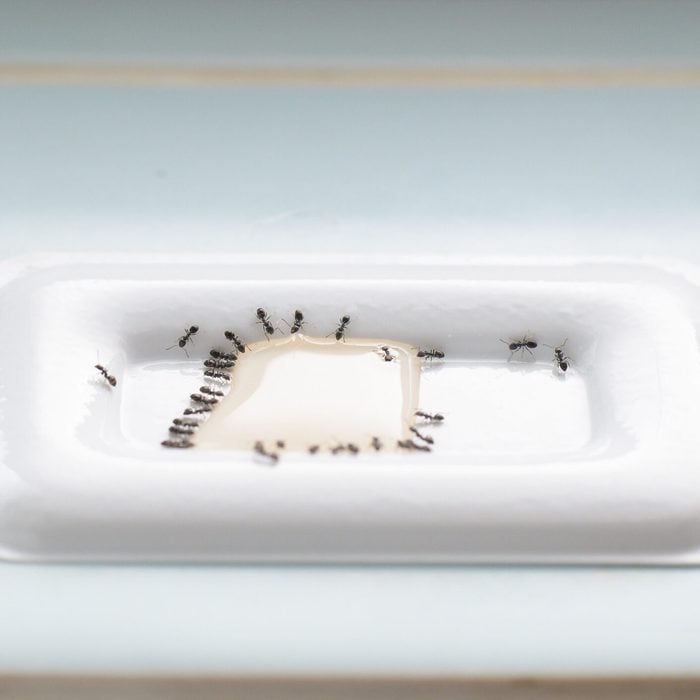
Liquid Ant Bait
Commonly available at hardware and home improvement stores, ant bait is highly effective. Look on the bait package for words like “controls both sweet and grease-eating ants.”
Set the bait out in areas you’ve previously seen ants, likely near the kitchen or pantry. (Be mindful that the bait is toxic, so keep it clear of children and pets.) Once it’s out, don’t be surprised if you suddenly see lots of ants. That’s a good thing. It means more ants are taking the toxic bait back to the colony where they’ll share it with the rest of the ants, including the queen, and kill them.
If you still see ants after two weeks, try a different type of bait. While liquid bait is the best way to kill many sweet-loving ants, other ants prefer solid bait. Simply replace the bait containers and try again.
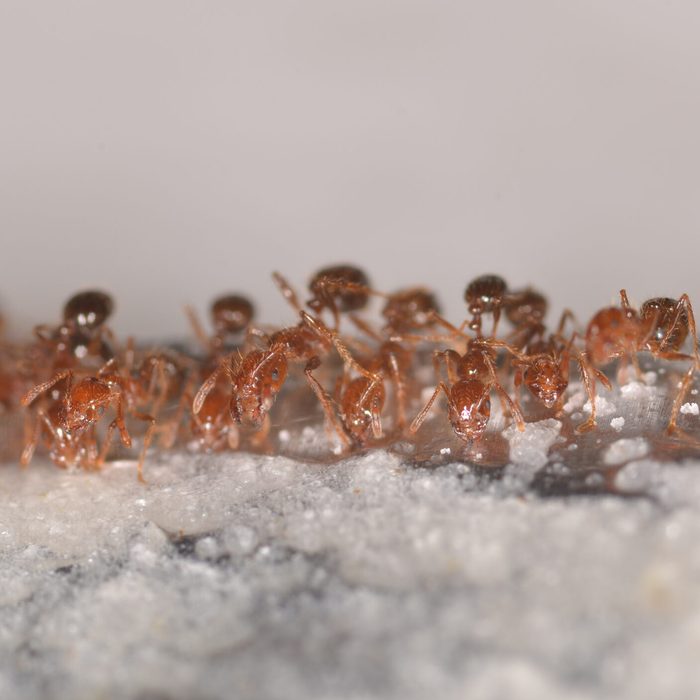
Borax and Sugar
Many people prefer to use natural products at home. In that case, try using borax to eliminate ants. An old-fashioned mineral cleaner, borax has dozens of uses, including poisoning pests.
A common recipe is to mix three parts sugar with one part borax. (The sugar is necessary to attract the ants; they won’t eat the borax on its own.) Use a small container to hold the bait.
Although borax is natural, it’s still harmful if ingested, especially by children or pets. Keep any ant traps out of their reach.
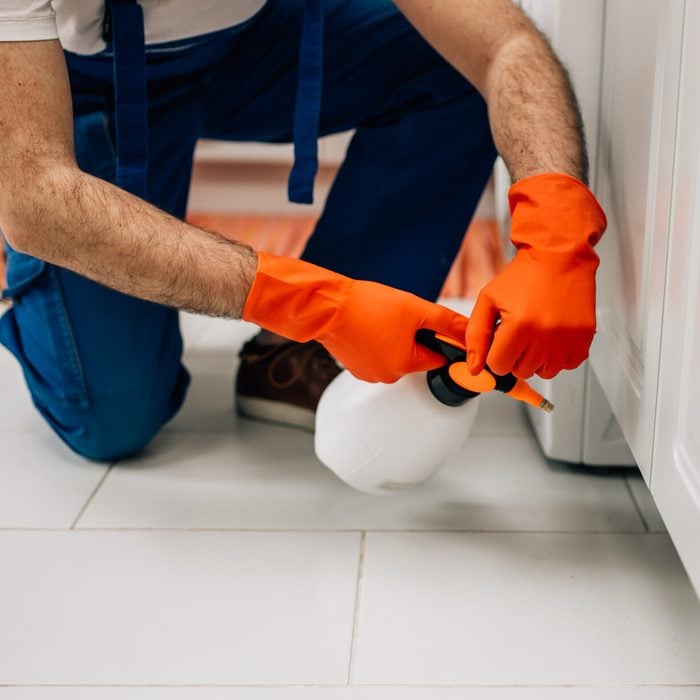
Insecticide with Bifenthrin
To prevent ants from entering the house, spray an insecticide that contains bifenthrin, permethrin or deltamethrin around doors and windows. Spray a 4-inch-wide band along entry points, just enough to wet the surface. Once dry, the spray leaves an invisible film that repels ants, so they won’t enter the house.
Each spring, spray the insecticide again to guard against ants. Keep in mind that this only works to keep ants out—it won’t kill ants that are already inside, and it can actually interfere with the use of ant baits.
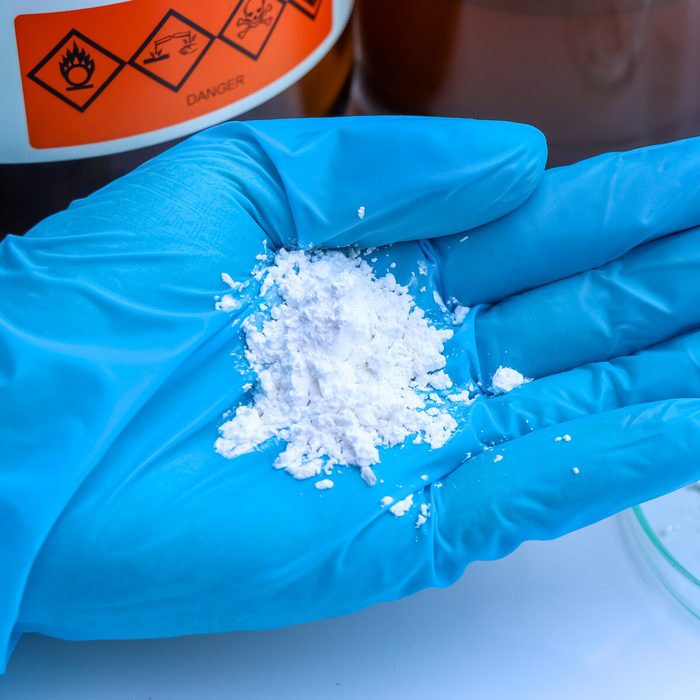
Boric Acid
Boric acid is an effective poison against many types of worker ants. Since it’s quite potent, wear gloves while working with it, and keep it away from kids and pets.
In a container, stir 1/2 teaspoon of boric acid and 8 teaspoons of sugar into a cup of warm water. (As with borax, the sugar is necessary for attracting the ants to the poison.) Soak cotton balls in the solution and leave them around the house wherever you’ve seen ants. Near kitchen doors, the sink or the pantry are good spots. Replace the cotton balls every few days.
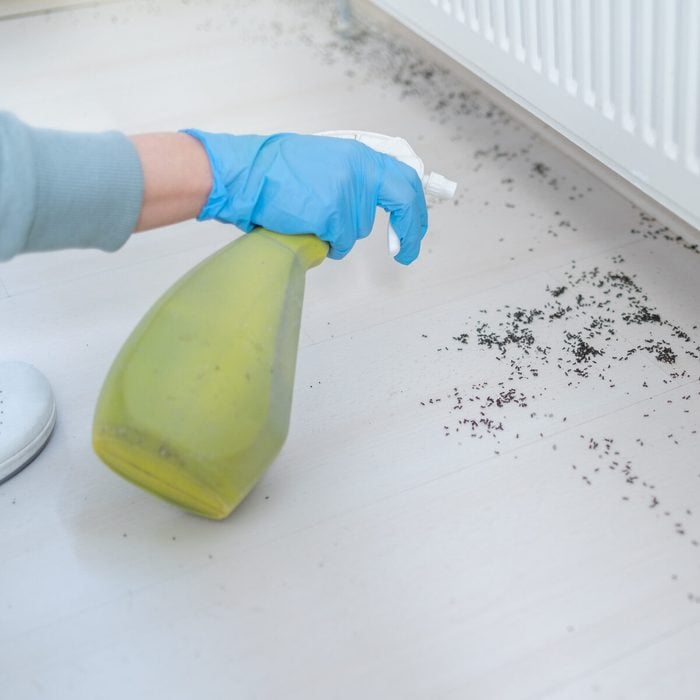
Glass Cleaner
Glass cleaners, like Windex, are a milder option for repelling ants. Similar to vinegar, these cleaning products erase the ant trail, preventing ants from marching in after their compatriots. The ammonia-based cleaner goes a bit further than plain vinegar, since the strong chemical actively repels ants. You can even use a homemade glass cleaner.

Neem Oil
Hoping for a chemical-free cleaning option? Avid gardeners are probably familiar with neem oil, a natural insecticide that effectively kills pests like aphids, as well as many kinds of ants. Look for neem oil at health food stores or online, and be sure to buy full-strength, as the diluted oil isn’t as effective. Spray neem oil anywhere you’ve noticed ants.
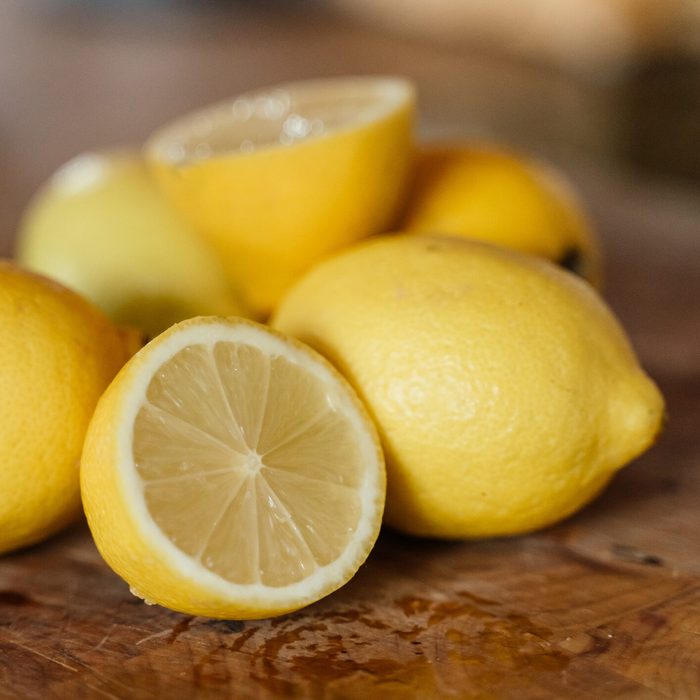
Lemons
With their natural acidity, lemons are excellent cleaners. They can cut grease and eliminate odors, replacing them with the far-fresher scent of citrus. Like vinegar and window cleaners, lemon juice effectively zaps the dreaded ant trail. Spray or wipe the juice anywhere you’ve seen ants, as well as around areas that contain food, such as pet food bowls. Lemon peels can also come in handy. Left in pantries or near entry points such as windows, the pungent citrus may deter ants from entering.
Tips for Keeping Ants Out
Once you banish the ants from your kitchen, keep up a few simple habits to make sure they don’t come back.
- Store food in airtight containers in your pantry.
- Keep up a regular habit of wiping counters and rinsing dirty dishes promptly.
- Trim back bushes, shrubs and trees that rest against your siding or roof, especially near kitchen windows or doors.
- Don’t stack firewood next to the house.



















